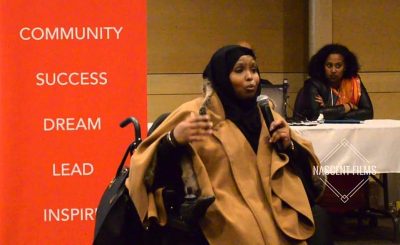by Kawsar Mohamed, CFICE CCEC Administrative Research Assistant
As a student with a disability, I am not surprised about the recent findings of Statistics Canada, which demonstrate that unemployment rates among people with disabilities are at least twice the national and provincial levels of all age groups. I was therefore ecstatic when I found out that Carleton University’s Paul Menton Centre for Students with Disabilities had partnered with the Government of Ontario to create a program that offers work-integrated learning placements for students with disabilities. Participating in the CUAEL program has given me a new opportunity to build my skills, while at the same time contributing to work that builds new opportunities for others through community-campus engagement.
Carleton University’s Accessible Experiential Learning (CUAEL) project is funded by the Ontario government through their career-ready fund and aims to provide 300 students with hands-on experience by subsidizing pay to employers that offer employment to students with disabilities.
After registering for the program, I was offered the opportunity to apply to jobs that matched my skills, interests, and education. This matching factor alone makes the program valuable because it gives students the chance to get the necessary experience to apply for the right professional jobs after their studies. My personal interest is to work in a field where I can use the skills that I have gained from my studies in law and human rights, such as research and analysis or communication and strategic planning, so I applied to a number of jobs that incorporated this skill development into the position.
The application process involved receiving emails from the CUAEL team with links to jobs that might interest me and sending my resume to the jobs I found interesting. Eventually, I was interviewed and was hired for the Community-Campus Engage Canada (CCEC) Administrative Research Assistant (RA) position.
CCEC is an emerging network composed of academics, civil society, and funding organizations from across Canada that has emerged as a legacy of the seven-year 2012-2019 Community First: Impacts of Community Engagement (CFICE) participatory research project based at Carleton Unversity. CCEC seeks to strengthen connections between community-campus engagement practitioners and co-create socially innovative research, experiential learning and community-first projects that are equitable, ethical, and respectful of all participants.
I have been working with them for three weeks now, and I find the experience fulfilling. I work with a great staff, and the work that CCEC does relates to my core interest in strengthening Canadian communities. As a participant of the CUAEL project, I can attest that the CUAEL program is doing what it sets out to do, not only by providing the students with necessary skill development, but also by addressing the employment gap of a growing group of persons with disabilities.
The CUAEL project also helps employers work through barriers they might have with respect to funding and hiring persons with disabilities. According to Amanda Bettencourt, the senior special projects officer of the CUAEL project, employers often don’t know what the field of accessibility looks like, nor do they know how to navigate it. So a lot of CUAEL’s work is to educate and increase awareness.
The choice to create the CUAEL project as an employment-based skill development program as opposed to a volunteer-based one is a vital part of what makes this program important in shifting employer attitudes and enhancing future opportunities for persons with disabilities. Studies show that volunteer opportunities don’t always lead to employment the way that paid placements do since the skills acquired in voluntary positions are often skills that support, complement, and extend the work of paid staff but are not the specific skills employers are seeking.
Students also frequently find themselves in precarious financial situations where they are struggling to pay for their studies while at the same time juggling living expenses. For example, a recent cross-campus study on student financial access to food completed by CFICE partner Meal Exchange demonstrated that food insecurity—the lack of physical and/or economic access to adequate and appropriate food—was experienced by 39% of surveyed students, with certain demographic groups experiencing much higher rates of food insecurity compared to their peers. Ensuring that the CUAEL project provides students with disabilities access to paid employment helps to reduce their risk of experiencing precarious financial situations, including food insecurity.
Similar to the development of the CUAEL fund, CCEC is currently working with Mitacs to develop a more inclusive fund to support community-campus engagement in Canada. This fund is meant to support community-first research, and knowledge creation focused on societal wellbeing and sustainability. It builds on Mitacs’ already successful Accelerate program, which sees graduate students employed by partner community organizations to work on research-based projects under community and academic supervision.
The intention is to create two new pools of funding through the new CCEC-Mitacs fund: One pool will fund graduate research students, post-docs and eligible college students embedded in non-profit community organizations. These students or post-graduates will work on research projects under community supervision, supported by the students’ academic supervisor. The second pool will support other activities undertaken by these organizations (including supporting their engagement in the research, where appropriate) that may not be eligible for matching Mitacs funding
By advocating for this new fund, CCEC and its partners are paving the way for more thoughtful funding programs that will make community-campus engagement opportunities available to as many people as possible, just as Carleton University’s Paul Menton Centre has done with its CUAEL project.

